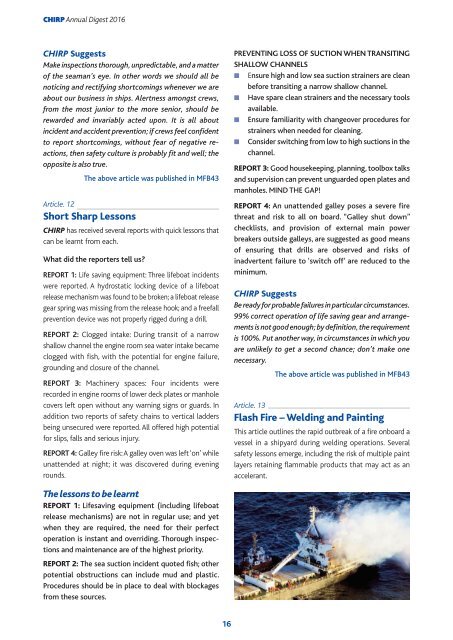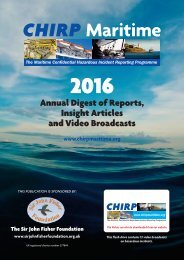CHIRP annual digest 2016 6th
You also want an ePaper? Increase the reach of your titles
YUMPU automatically turns print PDFs into web optimized ePapers that Google loves.
<strong>CHIRP</strong> Annual Digest <strong>2016</strong><br />
<strong>CHIRP</strong> Suggests<br />
Make inspections thorough, unpredictable, and a matter<br />
of the seaman’s eye. In other words we should all be<br />
noticing and rectifying shortcomings whenever we are<br />
about our business in ships. Alertness amongst crews,<br />
from the most junior to the more senior, should be<br />
rewarded and invariably acted upon. It is all about<br />
incident and accident prevention; if crews feel confident<br />
to report shortcomings, without fear of negative re -<br />
actions, then safety culture is probably fit and well; the<br />
opposite is also true.<br />
The above article was published in MFB43<br />
Article. 12<br />
Short Sharp Lessons<br />
<strong>CHIRP</strong> has received several reports with quick lessons that<br />
can be learnt from each.<br />
What did the reporters tell us?<br />
REPORT 1: Life saving equipment: Three lifeboat incidents<br />
were reported. A hydrostatic locking device of a lifeboat<br />
release mechanism was found to be broken; a lifeboat release<br />
gear spring was missing from the release hook; and a freefall<br />
prevention device was not properly rigged during a drill.<br />
REPORT 2: Clogged intake: During transit of a narrow<br />
shallow channel the engine room sea water intake became<br />
clogged with fish, with the potential for engine failure,<br />
grounding and closure of the channel.<br />
REPORT 3: Machinery spaces: Four incidents were<br />
recorded in engine rooms of lower deck plates or manhole<br />
covers left open without any warning signs or guards. In<br />
addition two reports of safety chains to vertical ladders<br />
being unsecured were reported. All offered high potential<br />
for slips, falls and serious injury.<br />
REPORT 4: Galley fire risk: A galley oven was left ‘on’ while<br />
unattended at night; it was discovered during evening<br />
rounds.<br />
PREVENTING LOSS OF SUCTION WHEN TRANSITING<br />
SHALLOW CHANNELS<br />
■ Ensure high and low sea suction strainers are clean<br />
before transiting a narrow shallow channel.<br />
■ Have spare clean strainers and the necessary tools<br />
available.<br />
■ Ensure familiarity with changeover procedures for<br />
strainers when needed for cleaning.<br />
■ Consider switching from low to high suctions in the<br />
channel.<br />
REPORT 3: Good housekeeping, planning, toolbox talks<br />
and supervision can prevent unguarded open plates and<br />
manholes. MIND THE GAP!<br />
REPORT 4: An unattended galley poses a severe fire<br />
threat and risk to all on board. “Galley shut down”<br />
checklists, and provision of external main power<br />
breakers outside galleys, are suggested as good means<br />
of ensuring that drills are observed and risks of<br />
inadvertent failure to ‘switch off’ are reduced to the<br />
minimum.<br />
<strong>CHIRP</strong> Suggests<br />
Be ready for probable failures in particular circumstances.<br />
99% correct operation of life saving gear and arrange -<br />
ments is not good enough; by definition, the requirement<br />
is 100%. Put another way, in circumstances in which you<br />
are unlikely to get a second chance; don’t make one<br />
necessary.<br />
The above article was published in MFB43<br />
Article. 13<br />
Flash Fire – Welding and Painting<br />
This article outlines the rapid outbreak of a fire onboard a<br />
vessel in a shipyard during welding operations. Several<br />
safety lessons emerge, including the risk of multiple paint<br />
layers retaining flammable products that may act as an<br />
accelerant.<br />
The lessons to be learnt<br />
REPORT 1: Lifesaving equipment (including lifeboat<br />
release mechanisms) are not in regular use; and yet<br />
when they are required, the need for their perfect<br />
operation is instant and overriding. Thorough inspec -<br />
tions and maintenance are of the highest priority.<br />
REPORT 2: The sea suction incident quoted fish; other<br />
potential obstructions can include mud and plastic.<br />
Procedures should be in place to deal with blockages<br />
from these sources.<br />
16



